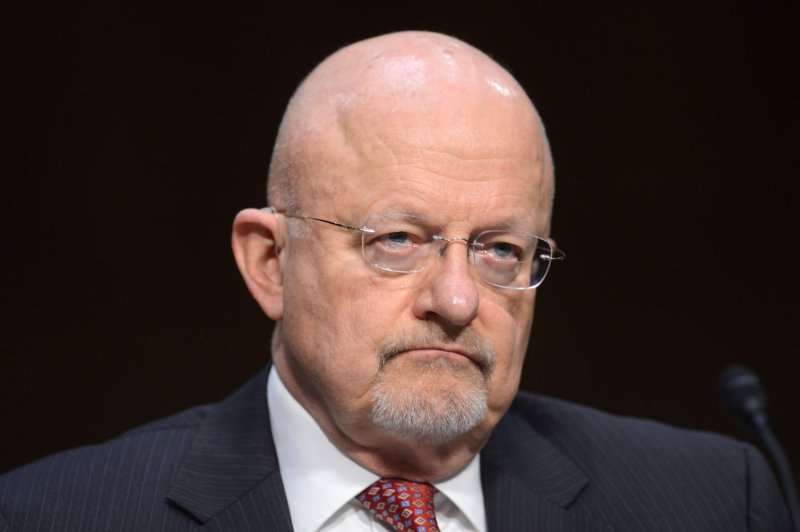Director of National Intelligence James Clapper testifies during a Senate Intelligence Committee hearing on current and projected national security threats on March 12, 2013 in Washington, D.C. UPI/Kevin Dietsch |
License Photo
WASHINGTON, July 2 (UPI) -- Sen. Ron Wyden, D-Ore., is "deeply troubled" by the top U.S. intelligence figure's public lie about domestic spying on Americans, the senator's office said.
Wyden said National Intelligence Director James Clapper's office within days admitted privately Clapper lied in public testimony at an open congressional hearing March 12, but Clapper refused to acknowledge this formally to the committee for 14 weeks.
The New York Times reported June 11 Wyden knew immediately Clapper's testimony wasn't true, because Wyden is a member of the Senate Intelligence Committee, which receives secret briefings from top intelligence officials, including Clapper.
But Clapper formally corrected the record only 11 days ago, when disclosures by rogue former National Security Agency contractor Edward Snowden prompted weeks of intense public pressure.
Wyden asked Clapper March 12 if the NSA collects "any type of data at all on millions or hundreds of millions of Americans."
Clapper answered, "No sir," then added, "Not wittingly. There are cases where they could inadvertently, perhaps, collect, but not wittingly."
He told NBC News June 9 he thought, "in retrospect," Wyden's question was akin to asking him when he was going to stop beating his wife, which he said was "not answerable, necessarily, by a simple yes or no."
"So I responded in what I thought was the most truthful, or least untruthful manner, by saying no," Clapper told the network.
In a June 21 letter first reported by The Washington Post Monday, Clapper admitted to the Senate Intelligence Committee his answer March 12 was incorrect.
"I have thought long and hard to re-create what went through my mind at the time," Clapper said in the letter, whose authenticity was confirmed by the Obama administration. "My response was clearly erroneous -- for which I apologize."
Clapper acknowledged the "heated controversy" over his remark, but in contrast to the rationale he gave to NBC News for saying no to Wyden's question instead of yes, the letter said Clapper misunderstood the question altogether.
Clapper said he thought Wyden was referring to NSA surveillance of email traffic involving overseas targets, not a separate program in which the agency is authorized to collect records of Americans' phone calls. The records include the phone numbers and how long the calls lasted but not individuals' names or what was said.
"Mistakes will happen, and when I make one, I correct it," Clapper said in his letter.
"Senator Wyden is deeply troubled by a number of misleading statements senior officials have made about domestic surveillance in the past several years," Wyden spokesman Tom Caiazza said.
"He will continue pushing for an open and honest debate about programs and laws that touch on the personal lives of ordinary Americans," Caiazza told British newspaper The Guardian, which along with The Washington Post has extensively reported on Snowden's NSA surveillance leaks.
Clapper's letter did not say why he took until June 21 to directly address the testimony error with the Senate committee.
Caiazza said Monday Wyden tried to get Clapper to correct the record shortly after his false testimony but was rebuffed.
"Senator Wyden had a staff member contact the Office of the Director of National Intelligence on a secure phone line soon after the March hearing to address the inaccurate statement regarding bulk collection on Americans," Caiazza told The Guardian.
"The ODNI acknowledged that the statement was inaccurate but refused to correct the public record when given the opportunity," Caiazza said. "Senator Wyden's staff informed the ODNI that this was a serious concern."
Clapper said in his note to the committee his "staff acknowledged the error to Senator Wyden's staff soon after the hearing," without pointing out this was a private acknowledgment.
"Director Clapper has deep respect for the role of our oversight committees in both keeping our nation safe and ensuring the privacy of all Americans are protected," a Clapper spokesman said Monday.
The New York Times said using "deep respect" in this way is a Washington code phrase meaning just the opposite -- no respect at all.
"The intelligence community will continue to work with all members of Congress to ensure the proper balance of privacy and protection for American citizens," the Clapper spokesman said.














